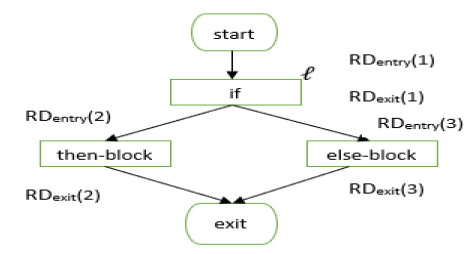I am reading the book "Principle of Program Analysis" by Flemming Nielson for annotated type systems. In the first chapter, section 1.6 they mentioned the simple type system for various statements(S). And S maps a state to a state, and may therefore to have type Σ --> Σ where Σ denotes the type of state. So they mentioned a system of axioms and inference rules like below for sequential statements and if-else block:
And later it is explained, an if-else statement in terms of Reaching Definition as below,
Also, I can visualize the sequencing rule seems natural, but they mentioned conditional rule is more dubious. I am not able to understand how this is dubious? As per my understanding reaching definition after after 'if' block execution will may execute then block or else block, then how this is even conflicting? S1 may have different statements and S2 will also have different statements but these two blocks would not execute at same time. I am not getting this scenario, can you please help me with this




